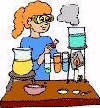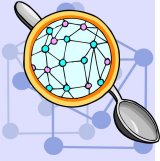
Worksheets and No Prep Teaching Resources
Reading Comprehension Worksheets
Matter

Matter
 Worksheets and No Prep Teaching Resources Reading Comprehension Worksheets Matter |
 Matter |
| edHelper's suggested reading level: | grades 5 to 7 | |
| Flesch-Kincaid grade level: | 7.25 |
| Print Matter, Elements, Molecules, and Compounds (font options, pick words for additional puzzles, and more) |
| Quickly print reading comprehension |
| Print a proofreading activity |
|
Matter, Elements, Molecules, and Compounds
By Cindy Grigg |

|
 1 What is matter? Matter is the stuff that makes up everything in the universe. Matter has mass and takes up space. Matter is made of atoms. Solids, liquids, gases, and plasma are all matter. When all atoms that make up a substance are the same, then that substance is an element. Elements are made of only one kind of atom. Because of this, elements are called "pure" substances. An atom is the smallest piece of an element that still has the properties of that element. For example, aluminum is a lightweight, shiny metal. If we took a piece of aluminum and cut it into small pieces, it would still be aluminum. It would still be a lightweight, shiny metal. The smallest piece would be called an atom. Atoms are so small they cannot be seen even with a microscope. Atoms consist of a nucleus that has protons and neutrons surrounded by electrons outside the nucleus.
1 What is matter? Matter is the stuff that makes up everything in the universe. Matter has mass and takes up space. Matter is made of atoms. Solids, liquids, gases, and plasma are all matter. When all atoms that make up a substance are the same, then that substance is an element. Elements are made of only one kind of atom. Because of this, elements are called "pure" substances. An atom is the smallest piece of an element that still has the properties of that element. For example, aluminum is a lightweight, shiny metal. If we took a piece of aluminum and cut it into small pieces, it would still be aluminum. It would still be a lightweight, shiny metal. The smallest piece would be called an atom. Atoms are so small they cannot be seen even with a microscope. Atoms consist of a nucleus that has protons and neutrons surrounded by electrons outside the nucleus. |
Create Weekly Reading Books
Prepare for an entire week at once! |
| Leave your feedback on Matter, Elements, Molecules, and Compounds (use this link if you found an error in the story) |
 |
Matter
|
 |
Science
|